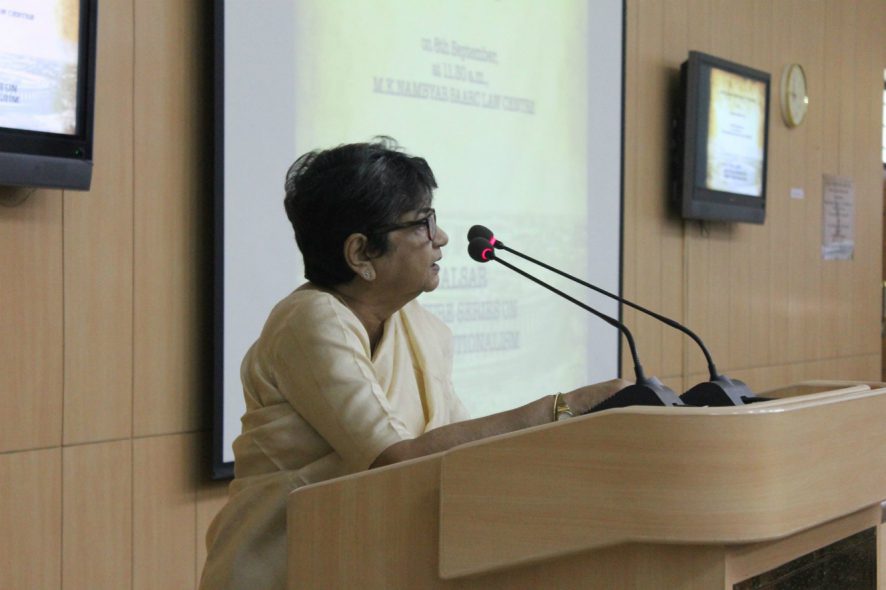NALSAR University of Law, Hyderabad, hosted Retd. Justice Ruma Pal on the 8th of September, 2016 for a lecture on the constitutional ideal of a Uniform Civil Code. The lecture was the second one in the ‘NALSAR Lecture Series on Constitutionalism’, following a talk by Dr. Arghya Sengupta on Judicial Appointments, Separation of Powers, and the Basic Structure Doctrine. Justice Pal, who retired from the Supreme Court in 2006, spoke about the need to reform personal laws in accordance with the constitutional ideals of equality and non-discrimination. It was noted that this was especially significant in the context of deeply entrenched patriarchal attitudes and gender discrimination rooted in the laws of marriage, adoption and succession. Justice Pal observed that the Constitution imposes a positive obligation on the state to operationalise the Directive Principles of State Policy, not only for the sake of uniformity, but also for social welfare. She remarked that uniformity was not to be seen in the sense of adopting a homogenous system, but rather as constitutional equality for all, as opposed to what the courts have interpreted so far.
Justice Pal put forth an interesting argument for first having uniformity within each personal law, for example, according the same rights and privileges to women as are accorded to men; before talking about a Uniform Civil Code. She explained this to mean that while all religions are free to have their own religious practices, basic fundamental rights as guaranteed by the Constitution should be available to all; and therefore personal laws should be reworked to respect these rights.
Justice Pal pertinently observed that the phrase used in Article 44 is ‘uniform’ and not ‘common’, this allows for maintaining religious diversity but ensuring a uniformity of base values. She argued for a need to have a balance between the Right to Freedom of Religion and Article 44 of the Indian Constitution. She stressed the need for existing statutory provisions, such as Section 6 of the Hindu Minority and Guardianship Act, 1956 (which designates the father as the natural guardian of a Hindu child), and Section 15 of the Hindu Succession Act, 1956 (Rules of succession for female Hindus), to be reexamined by the Legislature as well as the Courts, and be declared unconstitutional. Further, she opined that personal laws are required to be codified so as to avoid competing interpretations, and reformatory measures ought to be taken within the system of personal law itself, in consultation with the community. Justice Pal observed that there can be no legal opposition to constitutional uniformity within personal law systems. To this end, she highlighted India’s international obligations under the Convention on the Elimination of all Forms of Discrimination Against Women, which India ratified in 1993. In conclusion, she urged the Courts to become the harbingers of change, for the Legislature and the Government of the day are constantly occupied with politics, finance and foreign affairs to devote time to reforming an area such as that of personal law. In this light, Justice Pal emphatically stated that Courts should take a proactive role in exercise of powers of judicial review and strike down laws which are contrary to constitutional rights of individuals irrespective of gender.







